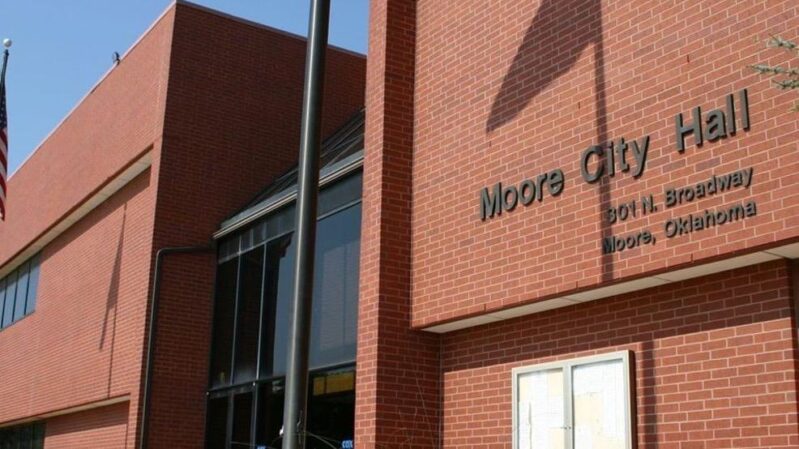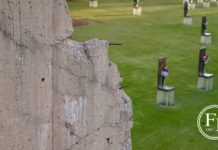Last Updated on August 6, 2023, 2:52 AM | Published: October 19, 2022
MOORE, Oklahoma — Led by Vice Mayor Adam Webb, Monday the Moore City Council:
- first endorsed two plans for new intersections on the Broadway and Eastern Avenue widening project.
- Council members decided on a controversial rezoning application which was tabled last meeting, and passed an interesting ordinance to conform with new State laws on underage nicotine possession.
EST engineering plans
Earlier this month, the Moore city council heard a few intersection plans for the Broadway and Eastern Avenue widening project.
EST Engineering firm brought back two concepts for each intersection in Monday’s meeting, and the council came to a formal endorsement on both.
For the 19th/Tower/Broadway intersection, the council decided that the plan with two separate intersections with two signals would work the best for the area.
Right now, the intersection is rated “C” in the AM and a “D” in the PM, meaning that drivers face a near gridlock-like condition in the evenings, and heavy morning traffic.
The new dual-intersection design will be rated an “A” for the AM and “B” for the PM, until 2045 at least according to EST. These ratings mean that drivers should notice little to no traffic and can freely switch lanes without issue for the foreseeable future.
For the Broadway/Eastern intersection, the council preferred the multi-lane roundabout design. It promises an A rating for all times of the day through 2045, and decreases the possibility of injury crashes by 70 or 80% when a light or signage intersection is converted, according to EST.
Both of the council’s choices were recommended by EST, and city manager Brooks Mitchell made sure that the council knew that these decisions are not concrete.
Ultimately, the project will show up on a future GO (general obligation) bond ballot for a vote by Moore residents.
The Council passed their recommendations unanimously.
Rezoning application 1025
In another return to business introduced in the last meeting, the council made their final decision on a controversial rezoning application.
The applicant aims to split his 5 acre lot into a 2-acre and 3-acre lot, one on which they plan to build a new house.
The planning commission and city staff originally recommended denial of the application unanimously, as did several of the applicant’s neighbors who showed up to the meeting.
The council had elected to table the item for further review.
The city is most worried that the applicant’s lot split could set a precedent where lot splits in neighborhoods across the city could strain infrastructure and fundamentally change Moore’s larger plotted neighborhoods.
Moore City Council was happy to hear input from residents on the issue and gave the applicant another chance to explain his position.
The applicant mentioned the subdivision behind their plot of land again, but brought something new to the discussion.
“We’ve contributed to this community. We have a family business. We hired local people. I’ve contributed a lot to this community.”
He spoke about his contributions to the community through charitable donations and assisting those in need after Moore’s tornadoes as well, ending his time by saying, “This is the first time I’ve asked you to consider something. It’s not going to impact our subdivision. It’s not going to impact our neighborhood. If anything, it’s an asset.”
A neighbor of the applicant spoke on some of the things he found false in the applicant’s reasoning, and at that point the council’s mind was made up.
Vice-Mayor Adam Webb addressed the room after the audience had an opportunity to speak, saying “We’ve had multiple calls, not just in this addition but around the city. I sympathize with you both but we would set a precedent all over the city, not just this one lot.”
He continued, “It would cause issues for multiple, multiple citizens, now and in the future, and so I will vote no.”
Councilmember Mark Hamm seemed to agree with the vice-mayor, with his view being that “It isn’t always a pleasant job. Nothing’s personal. We just have to do what we think is best for the city as a whole.”
The council voted unanimously to deny the rezoning application, but only after giving the application time in multiple meetings.
Enforcing laws on underage nicotine use
The City of Moore often has to work to correct municipal code to what is in line with state or federal regulations, usually adjusting city ordinances.
A state change to how nicotine products are defined and how underage use should be enforced leaves Moore in a strange situation.
The state added the definition of “Nicotine Product” to the list of tobacco, nicotine, or vapor products that are prohibited for those under 21.
The larger move by the state was to remove the municipal government’s ability to enforce ordinances on the use of these products by those under 21. The section of Moore’s ordinance on enforcement of underage nicotine possession was removed, meaning that Moore Police will be able to confiscate these products from underage users, but they cannot cite them or enforce the now defunct ordinance.
According to city legal staff, the new state statute states that “The able commission will require the violator to complete an education or tobacco use cessation program,” and they will establish rules to notify the parents of these underage users. This system is not directly enforced by officers, with legal staff seemingly saying that police may have to take names and addresses from offenders to send them to the able commission.
The loophole in enforcement will not last for long, according to the council, but it does put the city in a bizarre place for the time being on underage nicotine law enforcement.
The next Moore City council meeting is scheduled for Monday, November 7th at 6:30 PM.
Damian Powell is our government reporter for the smaller municipalities in the OKC metro such as Moore, Norman, Bethany, and Warr Acres. Damian is studying Political Science at the University of Oklahoma.











